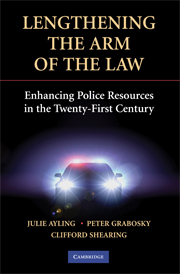7 - Ambiguous Exchanges and the Police
Published online by Cambridge University Press: 05 June 2012
Summary
INTRODUCTION
As previous chapters have shown, police departments engage in all manner of exchanges with institutions and individuals outside their ranks. They command assistance from common citizens. They buy and sell goods and services. They receive donations in cash and in kind from business and from ordinary individuals.
At times, these exchanges have been inherently criminal transactions. Coerced confessions and ‘third degree’ methods were common practice a century ago in English-speaking democracies (Skolnick and Fyfe, 1993: 43–48), and still take place in many countries. Although rare as a matter of official policy, police have sold all varieties of contraband, and have traded dispensation in return for cash or favours. And gifts to police in implicit anticipation of special consideration have long been commonplace in urban society.
But today, at least in advanced democracies, most of the exchange along the three dimensions of coercion, sale, and gift is completely legitimate. Requiring assistance to law enforcement by mandating record-keeping and disclosure of transactions by second-hand goods dealers makes the fencing of stolen goods more difficult to accomplish. Fee-for-service or user-pays policing helps defray the cost of deploying public police to secure special events of a commercial or private nature such as concerts and professional sporting events. In addition to uniforms, firearms and motor vehicles, police purchase products as diverse as kitchen and bathroom fittings and equipment, specialised apparel photographic equipment, musical instruments and livestock in the form of dogs and horses (see Chapter 4).
- Type
- Chapter
- Information
- Lengthening the Arm of the LawEnhancing Police Resources in the Twenty-First Century, pp. 223 - 235Publisher: Cambridge University PressPrint publication year: 2008

